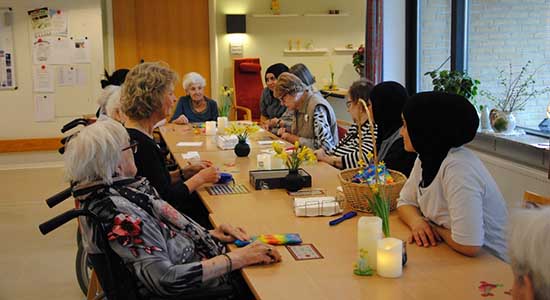Co-Creating Activities for Older Citizens in the City of Ishøj
Ishøj Municipality has continuously adopted co-creation as a development method in the elderly area. Through the platform “Older People Network”, a close collaboration has been established between the municipality, association, and citizens in Ishøj on the development of elderly activities and elderly life in Ishøj.

The aim of the project is to follow and explore some of the existing and new work processes in Ishøj and thus contribute to competence development in the field of older people. The study is based on various collaborative relationships between the municipality and civil society, some of which are closely connected, whereas others are more peripheral relationships. Thus, the study is partly focused on the interactions that already seemed to work between the municipality and civil society and partly on the possible fractures that could challenge new and close collaborative relationships.
The qualitative study was developed and conducted in a collaboration between Ældre og Rehabilitering, Ishøj Municipality, and Copenhagen Centre for Health Research in the Humanities (CoRe) and the Center for Healthy Ageing (CESA), University of Copenhagen.
Qualitative methods such as semi-structured interviews, focus group interviews, and observations were used for collecting material. The qualitative research was combined with a user-involving process, which entailed a dialogue with the project partners and informants about the analytical insights.
The qualitative study provided insights into different forms of cooperation between the municipality and civil society in Ishøj. Interviews were conducted with a wide range of municipal employees in Ishøj to explore how governance rationales and collaboration with civil society characterize and transform municipal work. At the same time, older people associated with various voluntary initiatives were interviewed about their experiences and expectations of volunteering and cooperation with the municipality. The interviews were structured according to a guiding interview guide with questions within the main topics: experience with interdisciplinary co-operation; roles and role distribution; and experiences of authority, commitment, and ownership. As a method, semi-structured interviews offer insights into the perceptions and experiences of an individual; by contrast, focus group interviews are an effective method of eliciting the exchange of experience and dynamics between the participants. Focus group interviews also allow for participants to confirm, nuance, or challenge each other’s statements, which can help to bring several perspectives into play at once. On the contrary, semi-structured interviews provide a clearer picture of an individual’s experiences, life situation, and life history.
Observation was the final method used in this study. Observations especially contributed to contextual understanding, and the method offered the project worker from CoRe the opportunity to experience and engage in more informal talks and discussions outside the interview situation. The observations involved different degrees of participation and interaction with the field on the part of the project worker.
Læs rapporten Brudflader og samspil på ældreområdet (pdf).
Research
| Name | Title | Phone | |
|---|---|---|---|
| Jespersen, Astrid Pernille | Professor | ||
| Lassen, Aske Juul | Associate Professor |
Bundgård Toft, Cammilla
Funding
The project was funded by Ishøj municipality and CESA.
Project period: October 2016–February 2017
